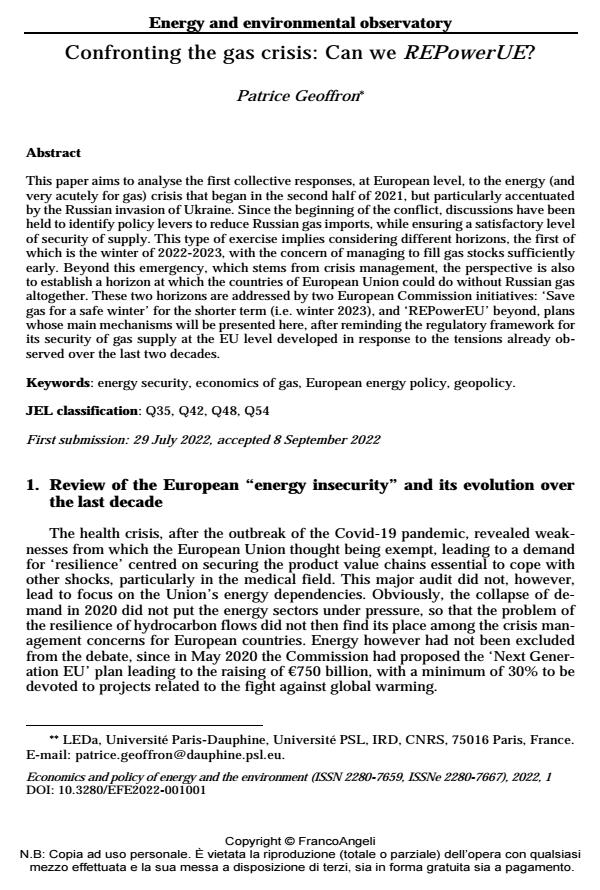Confronting the gas crisis: Can we REPowerUE?
Journal title ECONOMICS AND POLICY OF ENERGY AND THE ENVIRONMENT
Author/s Patrice Geoffron
Publishing Year 2022 Issue 2022/1
Language English Pages 11 P. 5-15 File size 66 KB
DOI 10.3280/EFE2022-001001
DOI is like a bar code for intellectual property: to have more infomation
click here
Below, you can see the article first page
If you want to buy this article in PDF format, you can do it, following the instructions to buy download credits

FrancoAngeli is member of Publishers International Linking Association, Inc (PILA), a not-for-profit association which run the CrossRef service enabling links to and from online scholarly content.
This paper aims to analyse the first collective responses, at European level, to the energy (and very acutely for gas) crisis that began in the second half of 2021, but particularly accentuated by the Russian invasion of Ukraine. Since the beginning of the conflict, discussions have been held to identify policy levers to reduce Russian gas imports, while ensuring a satisfactory level of security of supply. This type of exercise implies considering different horizons, the first of which is the winter of 2022-2023, with the concern of managing to fill gas stocks sufficiently early. Beyond this emergency, which stems from crisis management, the perspective is also to establish a horizon at which the countries of European Union could do without Russian gas altogether. These two horizons are addressed by two European Commission initiatives: ‘Save gas for a safe winter’ for the shorter term (i.e. winter 2023), and ‘REPowerEU’ beyond, plans whose main mechanisms will be presented here, after reminding the regulatory framework for its security of gas supply at the EU level developed in response to the tensions already ob- served over the last two decades.
Keywords: energy security, economics of gas, European energy policy, geopolicy.
Jel codes: Q35, Q42, Q48, Q54
- Introduction National Energy and Climate Plans in perspective: How can we strike a balance between the desirable and the sustainable? Luigi De Paoli, Patrice Geoffron, in ECONOMICS AND POLICY OF ENERGY AND THE ENVIRONMENT 1/2024 pp.15
DOI: 10.3280/EFE2024-001002 - Is Sustainable Innovation an Impetus to Sustainable Development Goals? Evidence From the EU Khalid Khan, Adnan Khurshid, Chi Wei Su, in Sustainable Development /2025 pp.3511
DOI: 10.1002/sd.3307
Patrice Geoffron, Confronting the gas crisis: Can we REPowerUE? in "ECONOMICS AND POLICY OF ENERGY AND THE ENVIRONMENT" 1/2022, pp 5-15, DOI: 10.3280/EFE2022-001001